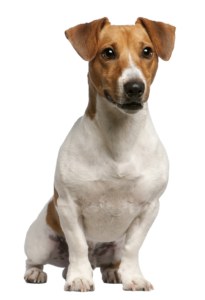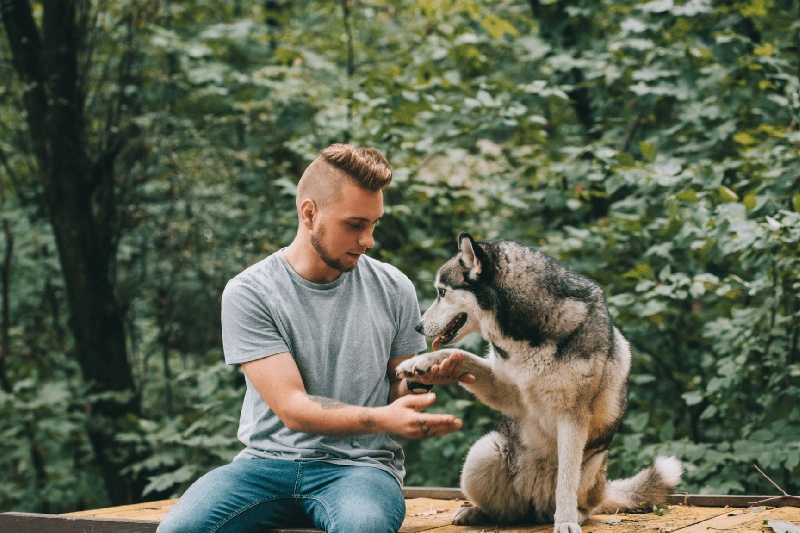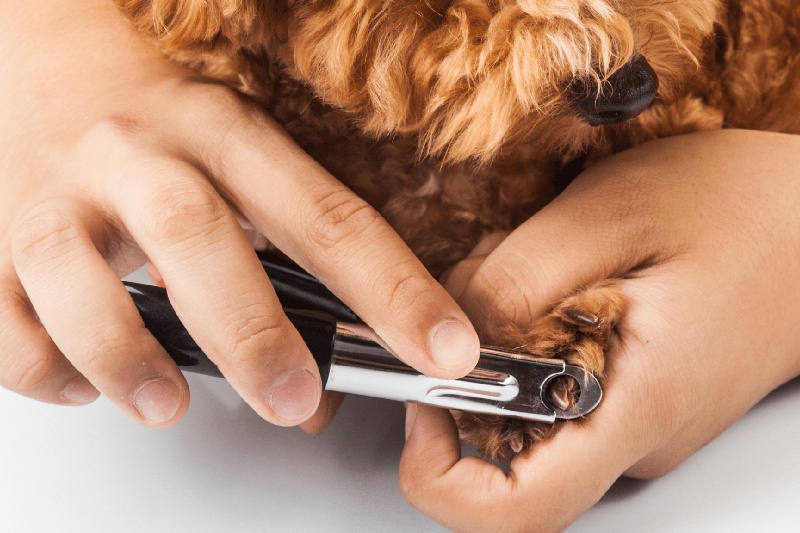Every dog is special and unique, particularly in the eyes of its adoring pet parent! From funny personality traits to little quirks, our dogs have very distinct personalities of their own and are a joy to be around as a result. However, oftentimes they can develop certain tics or habits that may be cause for concern. An example of this is excessive paw biting.
While licking and gnawing the paws is normal when done in moderation during the self-grooming process, often to remove dirt or debris from between the pads or toes, it can be one of the first signs of an underlying problem if it becomes a frequent and frustrating process for your pooch.
Reasons for excessive paw biting
As with any ailment a dog suffers from, there can be several potential reasons and it may be difficult to identify just one. This is why it is always best practice as a responsible pet owner to seek advice from a vet if you feel there is a problem that needs attention.
While you wait for a thorough assessment, you can also do some detective work of your own to find out more about the issue before you visit the vet.
Examining the affected paw for any surface injuries is a good start. Thoroughly checking each part, from the pads and the nails to in between the toes, look out for any gashes, blistering, scabs, ingrown nails, or perhaps a bee sting or the presence of a tick.
If your dog is struggling to bear weight on the affected paw, or if there is an unusual odour coming from it, this is also a sure-fire sign that a professional examination is needed.
-
VETIQ Christmas Variety Gift Pack for Dogs
£15.00 -
VETIQ Serene Calming Supplement Chews 230g
£16.00 Subscribe & Save up to 20%! -
VETIQ Serene Calming 50G
£17.50 Subscribe & Save up to 20%! -
Healthy Treats Serene Calming 50G, Multipack
£9.50 Subscribe & Save up to 20%! -
VETIQ Serene Calming Drops 100ML
£8.50 Subscribe & Save up to 20%! -
VETIQ Serene Calming 30 Tablets
£7.50 Subscribe & Save up to 20%! -
VETIQ Serene Calming 120 Tablets
£17.50 Subscribe & Save up to 20%! -
VETIQ Serene Calming +Plus 60 Tablets
£13.00 Subscribe & Save up to 20%! -
Healthy Treats Serene Calming for Small Dogs & Puppies
If no wound or clear sign of irritation is present, the cause could be something a little more difficult to pinpoint, such as:
Severe pain
If a dog is experiencing very aggravating pain, it is not uncommon for them to react by biting or excessively licking their paws. Perhaps the source of pain is in the paw itself, which could indicate discomfort from arthritis. It may also point to pain elsewhere in the body, which is why a vet needs to take a closer look.
A yeast or bacterial infection
A yeast infection in the paw can be a great source of irritation for a pooch, particularly if you have a specific breed of dog such as a cocker spaniel, German shepherd, shih tzu, or basset hound, all of which tend to be more susceptible to these types of complaints. What’s more, continuous gnawing at the paw area can lead to a secondary bacterial infection, which can thrive in areas where there is a build-up of moisture.
Parasites
The presence of parasites in the form of fleas, harvest mites, Demodex or Sarcoptes scabiei (the cause of scabies), can result in extremely itchy paws. Not only is this a source of irritation and frustration for your pup, but it also spells bad news for your home, as fleas and other such parasites will happily settle into your furniture and on your carpets. This means the entire house – as well as your dog – will need to be treated to eradicate them.
Allergies
A reaction to certain allergens contained in the likes of household chemicals and even different types of grass can lead to breakouts such as dermatitis. Such reactions can also be caused by food allergies.
Behavioural issues
In some cases, an increase in compulsive behaviour like paw biting will point to an issue like boredom or anxiety. This may be an avenue to explore if all other medical conditions have been ruled out.
How to stop your dog from excessive paw biting
If you suspect any of the issues above may be affecting your dog, a vet will hopefully be able to get to the root of the problem and offer a solution. This may be through specific medication, topical creams or other medical intervention required to get your pup back to their playful best.
If an infection or disease is not the underlying cause, it may be time to focus on your dog’s diet as the source of the irritation. Should a food allergy be identified as the main cause, a vet or pet nutritionist will be able to advise you on alternatives to their usual favourite foods.
It is wise to also take preventative measures before your canine companion is affected by paw trouble, by doing the following:
- Regularly take your pet to the groomers to have their nails trimmed to keep them neat, clean, and to avoid ingrown toenails.
- Washing your dog’s paws after long walks or trips outdoors can help prevent a build-up of debris and can alleviate the effects of certain chemical or environmental allergies.
- Using a natural flea and tick repellent can deter a possible infestation before it becomes a problem.
- Introducing a range of stimulating toys that will keep your dog busy and entertained will help to keep boredom at bay – and serve as a distraction from paw biting.
- Integrating a natural dietary supplement that promotes a calm demeanour and combats tension can help to reduce anxiety caused by a number of triggers. With a specially formulated blend of essential amino acids, vitamins and minerals, VetIQ Serene-UM® Calming Tablets have been recommended by veterinarians to do just this, without having a sedative effect.
- Keep your dog’s paws soft and moisturised by regularly applying a soothing balm.
Visit us today for more information on our range of products designed to promote the well-being of your prized pet.
-
VETIQ Christmas Variety Gift Pack for Dogs
£15.00 -
VETIQ Serene Calming Supplement Chews 230g
£16.00 Subscribe & Save up to 20%! -
VETIQ Serene Calming 50G
£17.50 Subscribe & Save up to 20%! -
Healthy Treats Serene Calming 50G, Multipack
£9.50 Subscribe & Save up to 20%! -
VETIQ Serene Calming Drops 100ML
£8.50 Subscribe & Save up to 20%! -
VETIQ Serene Calming 30 Tablets
£7.50 Subscribe & Save up to 20%! -
VETIQ Serene Calming 120 Tablets
£17.50 Subscribe & Save up to 20%! -
VETIQ Serene Calming +Plus 60 Tablets
£13.00 Subscribe & Save up to 20%! -
Healthy Treats Serene Calming for Small Dogs & Puppies
















